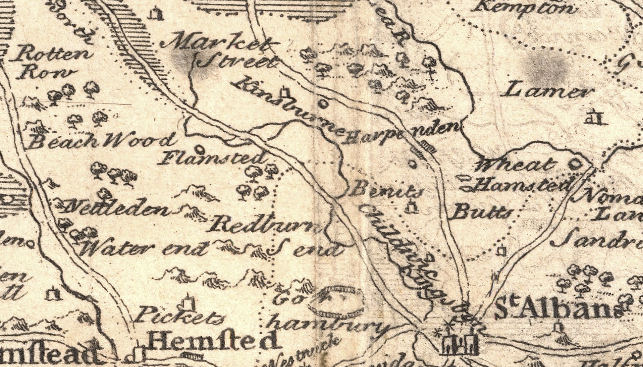|
|
Flamstead in 1746 |
|
|
Flamsted, or Verlamstede, as it was anciently termed, from the River Verlam, upon which it ftands; tho' fome will fetch its Name from the Flamines, or Roman Priefts, who had their Refidencc here; but the former Conjecture feems much the more probable. In the Time of King Edward the Confeffor, Leofftane, the Abbot of St. Alban's, gave this Manor to three Knights, Turnot, Waldolf, and Turman, to fecure the neighbouring Country from Robberies; but when the Conqueror had gotten England into his Power, he gave it to Ralph de Todeny, or Tony, his Standard Bearer at the Battle of Haftings. His Pofterity held it fame Succeffions, and Robert, the Heir in the fixth Generation, obtained a Charter of King Edward 1. for a Market every Thurfday, and a Fair on the Eve, Day, and Morrow, of the Feast of St, Leonard, and five Days following; but they are long fnce difufed. He died without Issue, and Alice, his Sifter, being found his Heir, married to Guy de Beauchamp, Earl of Warwick. His Heirs enjoyed this Manor fome Time, but Male Issue failing, it was, by the Marriage of Anne, the other Daughter of Henry, Duke of Warwick, tranflated to Richard Nevil, Earl of Salifbury, in whofe Family it continued not long; for his Widow out-living her Daughters, fettled it on King Henry VII, and his Heir Male, which was King Henry VIII. who gave it to the Ferrari; and their Female Heir marrying the Lord Vifcount Fanfhaw, fold it Serjeant Pecke, in whofe Family it ftill remains. The Rectory which is impropriated, was anciently in the Crown, and the former put in a Curate, but is now fettled on the Mafter and Fellows of Univerfity College in Oxford, who are obliged to appoint the Curate, and allow him 60 l. per Annum. In the Chancel here are divers Monuments and Infcriptions. One Anne Prior, of this Parifh, Widow, lived to the full Age of 120 Years. The Land here is a Clay, mixed with Flints, fo thick fpread upon it, that after a Shower, nothing appears but an Heap of Stones, and yet it bears very good Corn, even in dry Summers; which Fruitfulnefs is imputed to a Warmth in the flint, which preferves it from Cold in the Winter; and to its Clofenefs, which keeps it from a fcorching Heat, in the Summer. The Agreeable Historian, 1746
|


